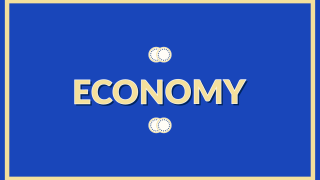“Don’t cross the stream to find water” says a Norwegian proverb, which is perfectly applicable to our dilemmas with respect to growth. Years of listening to governmental projects, independent proposals, and interminable discussions that contrast with the reality have obliged me to rethink my own appreciation of things and reflect on our penchant to ford the stream in search of what is there, directly in front of us.
The initiation of a year, and above all in this bona fide political year, would make it propitious to redefine the basic theme for our country. What follow are ideas, observations, and lessons learned concerning economic growth.
• Transcending all else, the problem is not technical but political. No matter how entrenched special interests and de facto powers are, the country needs ways out. What is required is a combination of project, strategy, and leadership. Countries that have been able to emerge from their respective logjams have assembled these three factors, on occasion surgically and in pre-planned fashion (such as Singapore or Korea), but in the majority of cases, it has been less plan than the political capacity to articulate a solution. This is where we have failed.
• This said, the technical component is fundamental. Years of meetings of the so-called “Huatusco Group” between economists of distinct schools of thought reached agreement on the general, but not on the specific, aspects. Many continue to think that the solution lies in a deficit in public expenditure, while others would leave everything to the market. The former do not recognize that when excessive demand is generated, we begin to import, and this leads us to an exchange crisis. The latter ignore that the government is there to create conditions for things that would otherwise be impossible. Some infrastructure projects are not inherently profitable, but they can make it possible for an entire region to develop, generating economic as well as social returns that transcend the original project by far.
• Our true challenge is the functioning of the government: we went from a government that did everything to one that does nothing, beginning with security. The government must create the conditions for development, blaze the trail, and set the economy on course. The solution does not reside in engendering an industrial future founded on protectionism, but rather, fostering investment in the country, starting with the development of an industry of national and foreign suppliers, but based in Mexico, as well as sectors of obvious potential, such as tourism.
• In Costa Rica, a tiny nation, the government offered a (proportionally) huge subsidy to Intel for them to establish a factory for manufacturing chips. Everyone criticized the project because, they argued, there was no sense whatever in subsidizing a private enterprise. These critics were right, but the government that provided the subsidy was thinking on a grand scale: what it wanted were not 300 direct jobs, but to convert the plant into a trigger of the transformation of Costa Rican into a services economy: the project obligated them to modify the entire educative structure of the country, forced them to construct modern industrial parks, and required investment in physical and health infrastructure comparable with that of other nations who wanted Intel. The result is that the whole Costa Rican economy was transformed from a sole project. No other Central American country has the perspectives that Costa Rica entertains. Leadership and vision.
• The business community complains about lack of credit. The evidence suggests that the problem does not arise there. Instead, our economy has split in two: the big companies that compete and export have no problem at all with acquiring credit, while the small ones have neither project nor capacity for utilizing credit. But the essential problem dwells in the factors that drive the existence of small businesses. One way of understanding the problem is that we have a formal economy made up of, typically, big businesses, and an informal economy composed of small businesses. The informal economy lives in tax and employment obscurity, which pleases many of the proprietors, but impedes the growth of employment, production, and productivity. At the core of the problem are found the tax and employment laws that, in practice, encourage informality. Labor costs and obligations are so trying and costly that they discourage formality; the fiscal procedures make tax evasion attractive. To grow, these two components will have to change. There’s no other way. While the tax bureaucracy and union interests continue to gain, the economy will remain paralyzed.
• Anyone who observes the creativity of the Mexican (from jacks of all trades to the pop and candy sellers in Mexico City traffic loops) knows that the entrepreneurial potential of the Mexican is infinite. However, this potential runs smack into the wall of bureaucracy, informality, insecurity, and rules of the game that favor big business. Creating a business is a hassle, and to registering it on the stock market is a near-death experience. The Brazilians are not better entrepreneurs, but their rules of the game facilitate the development of driven entrepreneurs who are disposed to have a go at it: in excess of one thousand businesses are registered on the stock market every year. Here just one group is worth more than 60% of the stock market.
To construct a country requires a sense of course and the certainty that the rules of the game will stand up. This is what differentiates rich from poor countries. When rich countries change the rules, as happened recently in the U.S., investment collapses. If this occurred there, where the institutions are so solid, here the challenge and the risk is immense. Time has convinced me that there is no successful country without strong and competent leadership. On lacking strong institutions, someone has to forge them and this implies vision and obliging the interests that have us paralyzed to fall into line. Of course, to bet money on an illuminated leader is equivalent to playing the lottery; but the evidence is enormous: Spain, Korea, Chile, Singapore, India, China, Brazil, South Africa. In each and every one of these cases there was project and leadership. And of course, there are dozens of examples of failed leaderships that led their countries, including ours, to break down. The difference must be made by a society that protects competent leaders but that at the same time delimits them and obliges them to behave. What we don’t need are power seekers, caciques in disguise, gamblers, or hope mongers of revolutionary justice. At the initiation of these pre-election years, it is imperative to meditate on the type of leadership the country needs and on the determinants to be imposed so that, once and for all, it would be the country that would prosper.
Quo Vadis?






Comments